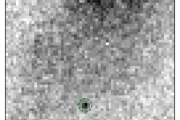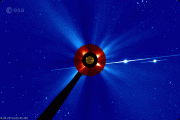
Copernical Team
Meteorite analysis shows Earth's building blocks contained water
 When our Sun was a young star, 4.56 billion years ago, what is now our solar system was just a disk of rocky dust and gas. Over tens of millions of years, tiny pebbles of dust coalesced, like a snowball rolling larger and larger, to become kilometer-sized "planetesimals"-the building blocks of Earth and the other inner planets.
Researchers have long tried to understand the ancient environm
When our Sun was a young star, 4.56 billion years ago, what is now our solar system was just a disk of rocky dust and gas. Over tens of millions of years, tiny pebbles of dust coalesced, like a snowball rolling larger and larger, to become kilometer-sized "planetesimals"-the building blocks of Earth and the other inner planets.
Researchers have long tried to understand the ancient environm Space Force invests $49.9 Million in university-based space technology research
 The United States Space Force (USSF), in a significant move to bolster its capabilities in space operations, has announced the selection of two prominent institutions under the Space Strategic Technology Institute 2 (SSTI 2) program. This initiative, in collaboration with the Air Force Research Laboratory (AFRL), aims to advance applied research in critical areas of In-Space Operations, notably
The United States Space Force (USSF), in a significant move to bolster its capabilities in space operations, has announced the selection of two prominent institutions under the Space Strategic Technology Institute 2 (SSTI 2) program. This initiative, in collaboration with the Air Force Research Laboratory (AFRL), aims to advance applied research in critical areas of In-Space Operations, notably Spire Global sets to revolutionize space traffic management with Northstar's SSA satellites
 Spire Global, Inc. (NYSE: SPIR) in collaboration with NorthStar Earth and Space, is set to launch the first commercial SSA satellite constellation, marking a significant milestone in space safety and sustainability.
The mission, dubbed 'Four of a Kind', is scheduled for no earlier than January 18, with a launch window between 19:15-20:00 NZT (06:15-07:00 UTC). The launch will take place at
Spire Global, Inc. (NYSE: SPIR) in collaboration with NorthStar Earth and Space, is set to launch the first commercial SSA satellite constellation, marking a significant milestone in space safety and sustainability.
The mission, dubbed 'Four of a Kind', is scheduled for no earlier than January 18, with a launch window between 19:15-20:00 NZT (06:15-07:00 UTC). The launch will take place at This US-Indian Satellite Will Monitor Earth's Changing Frozen Regions
 NISAR, the soon-to-launch radar satellite from NASA and the Indian Space Research Organisation (ISRO), will measure some key Earth vital signs, from the health of wetlands to ground deformation by volcanoes to the dynamics of land and sea ice.
This last capability will help researchers decipher how small-scale processes can cause monumental changes in the ice sheets covering Antarctica and
NISAR, the soon-to-launch radar satellite from NASA and the Indian Space Research Organisation (ISRO), will measure some key Earth vital signs, from the health of wetlands to ground deformation by volcanoes to the dynamics of land and sea ice.
This last capability will help researchers decipher how small-scale processes can cause monumental changes in the ice sheets covering Antarctica and Tianxing 1B satellite launched by Kuaizhou 1A to conduct space environment survey
 China's Kuaizhou 1A carrier rocket successfully launched an experimental satellite, Tianxing 1B, into space from the Jiuquan Satellite Launch Center in the northwestern Gobi Desert. The launch, which took place on Thursday morning, marks another milestone in China's rapidly advancing space program.
The rocket, a solid-propellant model developed by the China Aerospace Science and Industry C
China's Kuaizhou 1A carrier rocket successfully launched an experimental satellite, Tianxing 1B, into space from the Jiuquan Satellite Launch Center in the northwestern Gobi Desert. The launch, which took place on Thursday morning, marks another milestone in China's rapidly advancing space program.
The rocket, a solid-propellant model developed by the China Aerospace Science and Industry C D-Orbit Secures Record euro 100m in Series C Funding, Advancing Space Logistics and In-Orbit Services
 D-Orbit has announced the successful first closing of its Series C funding round, amassing approximately euro 100 million. This substantial funding, one of the largest for a European Space Tech company, builds on D-Orbit's impressive performance in 2023, including triple-digit annual revenue growth since 2021 and securing over euro 60 million in contracts from European governments and space ag
D-Orbit has announced the successful first closing of its Series C funding round, amassing approximately euro 100 million. This substantial funding, one of the largest for a European Space Tech company, builds on D-Orbit's impressive performance in 2023, including triple-digit annual revenue growth since 2021 and securing over euro 60 million in contracts from European governments and space ag NASA OTPS Study Sheds Light on Space-Based Solar Power Prospects for 2050
 In a recent development, NASA's Office of Technology, Policy, and Strategy (OTPS) has released a comprehensive report titled "Space-Based Solar Power," providing pivotal insights into the potential and challenges of harnessing solar power in space. This emerging field of research holds the promise of supplementing Earth's energy needs by collecting solar energy in space and wirelessly transmitti
In a recent development, NASA's Office of Technology, Policy, and Strategy (OTPS) has released a comprehensive report titled "Space-Based Solar Power," providing pivotal insights into the potential and challenges of harnessing solar power in space. This emerging field of research holds the promise of supplementing Earth's energy needs by collecting solar energy in space and wirelessly transmitti NASA's CHAPEA mission reaches 200-Day milestone in Mars Analog Study
 The first crew involved in NASA's groundbreaking Mars analog mission, CHAPEA (Crew Health and Performance Exploration Analog), has successfully crossed the halfway mark of their year-long mission. As of January 11, the four-person team has spent 200 days in a specially designed habitat at NASA's Johnson Space Center in Houston, with the mission set to conclude on July 6, 2024.
This crew, w
The first crew involved in NASA's groundbreaking Mars analog mission, CHAPEA (Crew Health and Performance Exploration Analog), has successfully crossed the halfway mark of their year-long mission. As of January 11, the four-person team has spent 200 days in a specially designed habitat at NASA's Johnson Space Center in Houston, with the mission set to conclude on July 6, 2024.
This crew, w Ax-3: A Step Forward in Long-Duration Space Missions with Advanced Tech Experiments
 Axiom Space, a key player in the burgeoning field of private space exploration, is set to launch its third private astronaut mission, Ax-3, to the International Space Station (ISS). Scheduled for liftoff no earlier than Wednesday, January 17, at 5:11 p.m. EST from Launch Complex 39A at NASA's Kennedy Space Center in Florida, this mission is poised to embark on a groundbreaking journey aboard a S
Axiom Space, a key player in the burgeoning field of private space exploration, is set to launch its third private astronaut mission, Ax-3, to the International Space Station (ISS). Scheduled for liftoff no earlier than Wednesday, January 17, at 5:11 p.m. EST from Launch Complex 39A at NASA's Kennedy Space Center in Florida, this mission is poised to embark on a groundbreaking journey aboard a S Revolutionizing Space Habitats: Aurelia Institute's TESSERAE for Biotech Studies
 The Aurelia Institute has taken a significant step in space habitat design with its TESSERAE project, offering a fresh perspective on life in space. TESSERAE, a departure from conventional design, is grounded in established spacecraft engineering principles. The Institute recently released an executive summary highlighting the ongoing case study of this self-assembling habitat.
Following t
The Aurelia Institute has taken a significant step in space habitat design with its TESSERAE project, offering a fresh perspective on life in space. TESSERAE, a departure from conventional design, is grounded in established spacecraft engineering principles. The Institute recently released an executive summary highlighting the ongoing case study of this self-assembling habitat.
Following t 



































